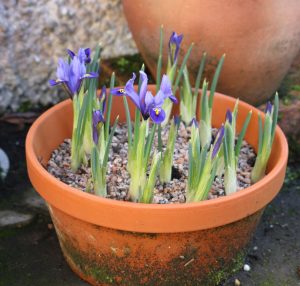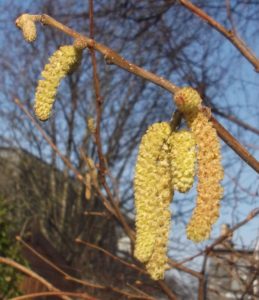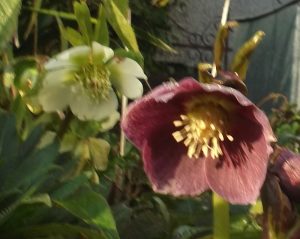
When you see these flowers in bloom you know that spring can’t be far off. I’ve ordered my seeds, but not sowed any yet, nor written any new poetry, but there are some special circumstances. So far February has been a very busy month, with book editing, a trip to London to see the Anglo-Saxon Manuscripts exhibition in the British Library (I’ve seen the Beowulf manuscript! I’ve seen a letter written by the scholar and bishop Alcuin to Charlemagne!), a trip to Liverpool with most of my family to celebrate my sister’s sixtieth birthday, and my daughter having a major operation, and living with us while she recovers.

I have been trying out the paces of the new camera. It can do a lot – it can practically talk to me – but it can’t do close ups so well. I’m going to need a macro lens for the flowers, and maybe a long range one for birds – this is getting expensive! but it is worth it for the way it makes me see things in more detail and in their proper context.
I’m hoping to translate this into new and rather different poems. I’ve been reading Vahni Capildeo’s Venus as a Bear, and it is like fireworks going off in my brain – the connections between words, lines, subjects and responses are not sequential but sensual, mostly visual, like mind maps. There are plays on sounds and language and visual as well as semantic connections, and you could almost read them in any direction. I am fairly sure that I couldn’t do anything like that – I get lost too easily. But after reading those poems my brain was ready for what happened next.
I am in the middle of reading Leechcraft by S Pollington, alternately impressed by the depths of his scholarship and startled by the limits of his actual experience. His identifications of plants refer to many learned sources, but I’m not sure he has ever seen any of them in his life, and he doesn’t seem aware of the many vernacular healing traditions recorded in Europe. But then I came across an exhaustive analysis of the many uses of the word ‘laec’ which became ‘leech’ and was later sometimes used as a synonym for ‘doctor’.
Pollington says that this was not the way the word was used in Old English, and quotes many sources where the word is used to mean ‘healing’, ‘exercise of skill’, ‘play’ or ‘a rite of sacrificial offering’. I once heard Patrick Stewart use the word ‘laiking’ for being variously ‘truanting from school’, ‘on holiday’ and ‘out of work’, and when I pushed this, something fell into place. ‘Laec’ is the important stuff you do when you aren’t ‘working’ – what my Church used to call ‘servile’ work’ – all the life admin, busywork, earning a living, mundane day to day stuff. ‘Laec’ is ‘recreation’ spelled re-creation as the self-help books do, holiday spelled ‘holy day’ as they used to do in the Middle Ages, the difference between ‘relieving symptoms’ and ‘healing’. It’s no wonder that industrialists and politicians like to confuse it with idleness and amusement, because it’s the stuff that can’t be bought and sold, and no-one else can do it for you.
This provided the link between my random musings about colour, craft, tradition and memory, the sense of self and the bond with community. I’m off on a poetic journey, but before I go, I’ll leave you with another spring-time picture from my garden.

Leave a Reply